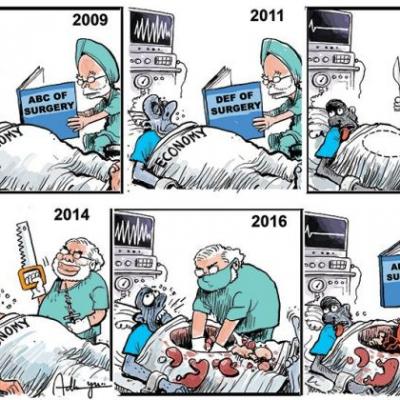Authorities across New Delhi, Kolkata, Midnapore and Rajkot seized over Rs 3 crore including Rs 32 lakh in new Rs 2000 bank notes on Friday.
In the national capital, the Income Tax department seized Rs 1.4 crore, including Rs 8 lakh in new currency in searches on the premises of a civil contractor as part of its anti-black money drive post demonetisation.
Officials said the seizure was made from a civil sub contractor identified as PL Soni in Karol Bagh area.
‘The seizure of new currency was made in the denomination of Rs 2000 notes. The old notes that were seized include the demonetised currencies of Rs 1000/500 and also the legal tender of Rs 100,” they said.
The department also conducted a survey operation at the Krishna Nagar branch of Axis bank here in connection with a probe, they said.
In West Bengal, police seized Rs 1.48 crore in demonetised notes in Kolkata and Rs 8 lakhs in Rs 2,000 notes in West Midnapore district, arresting five people in the two cases.
Kolkata police seized Rs 1,48,50,000, entirely in old Rs 500 notes, from an organisation in central Kolkata and arrested three people in connection with this case, a senior officer of the city police said.
During questioning, the trio allegedly said that the amount was meant to be delivered to one Govinda Agarwal as part of a business deal.
“We are probing whether this was part of a hawala deal or not,” the officer said.
In West Midnapore district, the police seized Rs 8 lakh in Rs 2,000 notes near Debra and arrested a man who runs an NGO, and his driver.
Police said the force intercepted Purna Sankar Ganguly’s car and seized Rs 8 lakh in Rs 2,000 notes, which he allegedly exchanged for Rs 10 lakh in demonetised notes.
Ganguly was returning from Debra and heading to Midnapore after exchanging the notes from someone who took Rs 2 lakh as commission.
Police said they were investigating how Ganguly obtained so much cash in Rs 2,000 notes and if any bank official was involved in the case.
In Rajkot, police seized Rs 16.35 lakh cash in valid currencies in two separate incidents and detained three people.
The cash comprised Rs 16 lakh in denomination of 2000 rupee and rest in Rs 100 bill, police said.
In the first incident, one Hiren Joshi was nabbed with 400 notes of Rs 2000.
“Based on a tip off, we intercepted Joshi near Kothariya colony area late last night. Upon searching his bag, we found Rs 8 lakh in cash. All notes were of Rs 2000 denomination,” said Bhaktinagar police sub-inspector M J Dhadhal.
According to police, Joshi told them he has been asked by a person to deliver these notes to an auto spare parts dealer.
“Since Joshi could not give any specific details about the source of cash, we have detained him and informed Income Tax department about the cash seizure. We have also launched a hunt to nab the supplier as well as receiver of these notes,” Dhadhal added.
In another incident on the outskirts of the city, police nabbed two persons with Rs 8.35 lakh cash, including Rs 8 lakh in Rs 2000 bills and Rs 35,000 in Rs 100.
http://www.hindustantimes.com/india...e-recovered/story-Lx5A5CrzVQrhrXDCNvhfAO.html
The op expected that India will have less corruption, due to demonetisation. Is this the sign of less corruption. On the contrary a new form of added corruption has creeped into the system.








